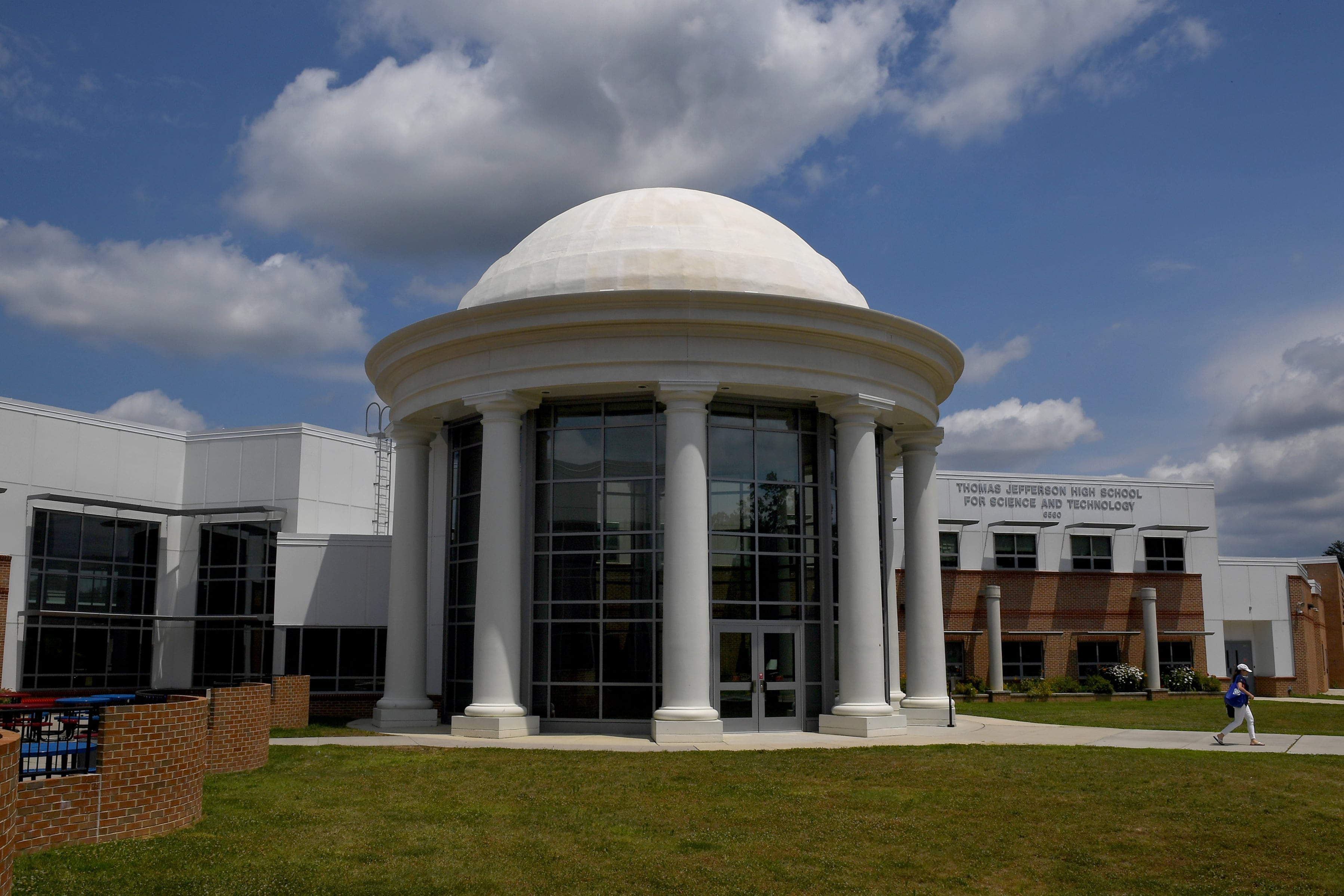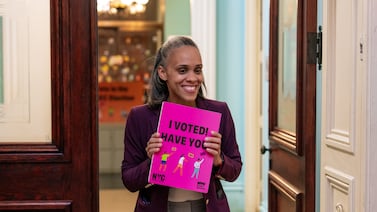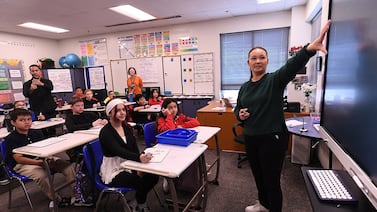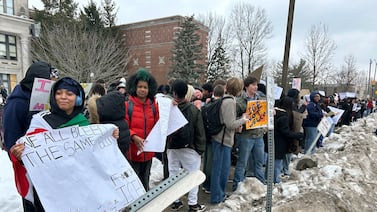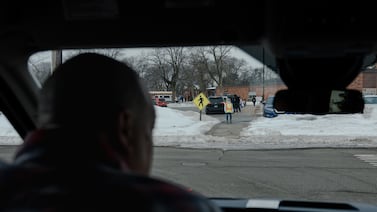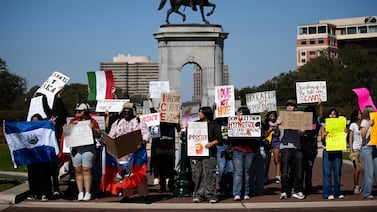Sign up for Chalkbeat’s free weekly newsletter to keep up with how education is changing across the U.S.
The federal departments of Education and Justice are investigating whether changes to the admissions policy at a prestigious Virginia high school violated the civil rights of Asian American students, even though the U.S. Supreme Court already let the updated admissions policy stand.
The investigation comes after the Virginia Attorney General’s Office said its own investigation found “reasonable cause” to believe bias against Asian American students motivated the changes at Thomas Jefferson High School for Science and Technology in Alexandria, Virginia, and referred the case to federal authorities.
Under President Donald Trump, the Education Department has warned school districts that even race-neutral policies that aim to diversify magnet schools and honors programs could amount to illegal discrimination, despite court rulings that have repeatedly upheld such policies.
Many school systems with selective high schools are in the midst of ongoing debate about how students should qualify for those schools.
This is the first civil rights investigation during the second Trump administration to look specifically at high school admissions. Other cases have targeted mentorship programs for students of color and antiracist teacher training that federal officials say invoked racial stereotypes as the Trump administration tries to root out common practices associated with diversity, equity, and inclusion.
Fairfax County Public Schools changed the admissions criteria for the school, commonly known as TJ, in 2020 with the goal of creating a more diverse student body.
The 1,800-student school draws from five area school districts and often sends students on to elite colleges and successful careers. In the years before the change, the student body typically was more than two-thirds Asian American. Most students came from just a few middle schools. Very few Black and Latino students attended the school.
The district dropped the use of standardized test scores, incorporated “experience factors” into the admissions process, and reserved seats for students from each middle school in the area. Parents, many of whom were Asian American, organized as the Coalition for TJ and sued the district over the changes, but the Supreme Court declined to take the case in early 2024. That seemed to be the end of the matter.
But this week Virginia Attorney General Jason Miyares, a Republican, said a two-year investigation had found evidence that anti-Asian American bias had motivated the policy change. Miyares said school board members in private communications described the policies as having “an anti asian feel” and that the changes would “kick out Asians.”
After the policy change, Asian American students went from 73% of admitted students to 54%, the attorney general’s office said. The share of white, Black, and Latino students all increased. The study body is currently about 60% Asian American, 20% white, 7% Latino, and 5.5% Black.
The attorney general’s office did not release a full report that would provide more context for board member comments and told Chalkbeat to obtain it from the school district. The school district said it would consider the request but did not immediately share the report. Coalition for TJ also alleged in its lawsuit that the school district was biased against Asian American students, but the court did not find that the policy change violated equal protection requirements.
Miyares referred the case to the federal Justice and Education departments, which announced they would open Title VI investigations into the district. Title VI protects students from discrimination on the basis of race or shared ancestry.
“Thomas Jefferson High School in Fairfax County has long had a reputation for producing some of our nation’s brightest minds, due in no small part to its rigorous admissions process,” Education Secretary Linda McMahon said in a statement announcing the investigation. “The Fairfax County School Board’s alleged decision to weigh race in TJ’s admissions decisions appears to be both contrary to the law and to the fundamental principle that students should be evaluated on their merit, not the color of their skin.”
A spokesperson for Fairfax County Public Schools said the district was reviewing documents related to the investigation and would have a more detailed response in a few days.
“This matter has already been fully litigated,” the district said. “A federal appellate court determined there was no merit to arguments that the admissions policy for Thomas Jefferson High School for Science and Technology discriminates against any group of students.”
Admissions policy changes are contested ground
Yuyan Chou, a member of Coalition for TJ, told local TV station WUSA9 that the federal investigation gives parents new hope.
“The Supreme Court decided basically not to hear our case and at that point, I thought the American dream died,” she said. “There’s no path forward, there’s nothing going to happen again until today. I believe there is a chance we can revive that dream.”
Chris Kieser, a senior attorney for the Pacific Legal Foundation, which represented Coalition for TJ and regularly brings lawsuits opposing affirmative action, said he was pleased to see the federal government take another look at the case.
“We certainly think there are grounds to investigate,” he said. Just because the Supreme Court didn’t take up the case “doesn’t mean there were no issues.”
Kieser said the Pacific Legal Foundation continues to hope that the Supreme Court will take up a high school admissions case. Policies that aim to diversify selective high schools often end up discriminating against Asian American students, Kieser said, and the fact that those student continue to gain admittance at high rates under revised policies doesn’t mean they don’t discriminate against individual students.
Derek Black, a law professor at the University of South Carolina, said civil rights investigations can apply a different standard in seeking to protect students than the Supreme Court did in declining to hear the case. But the Education Department’s interpretation of the law appears to be in direct violation of court rulings.
“They have no legal authority to enforce Title VI in a way that is inconsistent with the law,” he said. “If TJ is willing to stand up for itself, it will have to challenge the administration in court. And this is what has been going on all over the country.”
Civil rights investigations often result in negotiated settlements in which school districts agree to make certain changes. The federal government also has the power to withhold federal funds to penalize school districts. Historically that hasn’t happened. But under Trump, the federal government has used its civil rights enforcement powers more aggressively in an effort to get states and school districts to comply with its interpretations of the law.
Black said the department appears to be applying disparate impact theory — a type of legal analysis that looks at whether certain policies affect certain groups in disproportionate ways — to a high school admissions policy just weeks after Trump signed an executive order barring the use of disparate impact theory.
The administration would need a “smoking gun” that showed bias against Asian American students to conclude that the district violated those students’ civil rights, Black said.
Erica Meltzer is Chalkbeat’s national editor based in Colorado. Contact Erica atemeltzer@chalkbeat.org.

